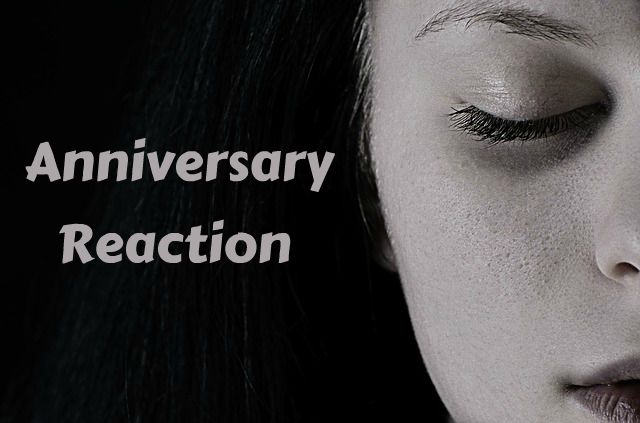Anniversary Reaction
I may forget where I placed my eyeglasses (and yes, it’s possible they’re on my head).
I may forget what I ate for breakfast (but I probably didn’t forget to eat!).
And I may forget your birthday (even though it’s written on my calendar).
So how come—without even trying—I remember the day my husband was diagnosed with cancer? Or the date he died?
It’s not all in my head . . . or is it?
Anniversaries are on my mind these days. My wedding anniversary is this week. A date we celebrated for more than a few decades as the beginning of a new life together. A date that now brings recollection of loss instead of gain.
How is it you might feel unsettled on your birthday—only to realize days later it was because you’ve reached the same age your father was when he died?
Or consider how sexual assault victims suffer from emotional upheaval as the calendar marches toward a date they’re desperately trying to forget?
And what about the grief women experience long after an abortion, even though they may not consciously connect their emotions with the event?
How can a box on a calendar cause us to experience nightmares, or make us feel fatigued, depressed, or anxious—even though the event it marks occurred years earlier?
Psychologists refer to this as an anniversary reaction or an anniversary effect. A date becomes a trigger, causing us to relive emotions we thought had been resolved.
So how do we, as Christians, handle anniversary reaction? Even though the phrase anniversary reaction is not found on the pages of Scripture, God’s Word has much to say about how to cope with trauma or loss.
Acknowledge the reality of anniversary reaction:
We do an injustice when we tell ourselves—or others—that “it’s all in our head.” Or when we try to convince ourselves that mature Christians should be able to shake it off and just trust God. God created us as beings with emotions that are real. And when those emotions are raw, we need to take them to Him. David poured his heart out to God in Psalm 31:9-10, when he wrote:
“Be gracious to me, O Lord, for I am in distress; my eye is wasted from grief; my soul and my body also. For my life is spent with sorrow, and my years with sighing; my strength fails because of my iniquity, and my bones waste away” (ESV).
Believe what we say we believe:
It’s one thing to say we believe God is our comforter. But when we’re reeling from the blows of an anniversary reaction, we have the opportunity to live out what we claim. Is Psalm 147:3 merely poetic or do we truly believe “He heals the brokenhearted and binds up their wounds” (ESV)?
Trust Christ for the “now” as well as for eternity:
We can fall into the trap of thinking the blessings of salvation begin when we die. But John 3:36 tells us we have eternal life, not that we will have it. These blessings are for now as well as later. Jesus told His disciples, “Peace I leave with you, my peace I give to you. Not as the world gives do I give to you. Let not your hearts be troubled, neither let them be afraid” (John 14:27 ESV).
Receive the peace Christ gives:
Philippians 4:6-8 (ESV) reminds us, “Do not be anxious about anything, but in everything by prayer and supplication with thanksgiving, let your requests be made known to God. And the peace of God, which surpasses all understanding, will guard your hearts and your minds in Christ Jesus.”
Pass it on:
How often has a well-meaning friend said, “I understand how you feel” when we know they can’t possibly understand what they have not experienced?
But the flip side is also true. Sometimes the best conduit of comfort is the act of offering it to someone who has experienced a similar loss or trauma. If we have received—and are continually receiving—God’s comfort, then we’re in a position to share it. We do understand because we’ve “walked a mile in their shoes.” The apostle Paul wrote: “Blessed be the God and Father of our Lord Jesus Christ, the Father of mercies and God of all comfort, who comforts us in all our affliction, so that we may be able to comfort those who are in any affliction, with the comfort with which we ourselves are comforted by God” (II Corinthians 1:3-4 ESV).
Anniversary reaction is real. But so is the peace, grace, and comfort we receive from God—the One who redeems us out of this broken world. The heartache we experience is also real. But it’s temporary because a time is coming when there will be no more tears or death or pain (Revelation 21:4).
Until then, will you and I choose to live out the reality of our relationship with Christ today, even during the anniversary reactions in our life?






Well said
.
You have put it so well into words what I have felt! Very encouraging.
Yes, yes, yes. Anniversary reaction is a real thing. Some people understand and some don’t. Thank you for sharing about this.
Amen — reacting to an anniversary is very real. And it’s not wrong to remember and feel the loss or the pain ever deeper on that day. Our feelings are important. I’m so thankful Jesus walks beside me in all of this. Even when I hurt, I am not alone.
Such an important message here. You give hurting people the information they may need in order to move forward from a trauma that revisits them. And the encouragement of scripture too! Wonderful!
So very sorry to hear of your loss and pending anniversary. Each year I experience this as we approach my son’s birthday on September 8 followed by the anniversary of his death on September 17. I do take comfort for God since this event 27 years ago but the sorrow comes from missing the person and the what ifs. God does take away the pain of the loss.
Such wonderful truths! I have never heard of Anniversary Reaction. But I’m familiar with grief and its many forms. Thank you for pointing us all to the comfort of God!
Sometimes the best conduit of comfort is the act of offering it to someone who has experienced a similar loss or trauma. Hear me, Ava, that your experience with grief has helped me cope with mine. I’m blessed God connected the two of us; he’s used you to minister to me. Much love and appreciation!
Awww . . . thank you, Candice. And I agree, it’s no coincidence that God connected us, first as strangers in an online group, then in person at the Colorado Christian Writers Conference!
Great post, Ava. I remember reading in a Lysa Terkeurst book about why we remember certain things and not others. She shared how Dr. Caroline Leaf, a leading Neuroscientist, notes how memory receptors in our brain work. We remember what we have an emotion tied to. Whether it is surprise, happy, sad, traumatic, joyous, etc.. We will remember everything we are emotionally connected to.
I love what you said here: Trust Christ for the “now” as well as for eternity.